The debate about whether companies should take a political stance or not is never-ending. The reason being no one can predict the reaction of the customers after companies take a stance on the ongoing political debates. Marketers have different reasons for stating their opinion on companies making political statements. As per Goodfirms research, taking a political stand has become critical as today’s consumers prefer brands that speak for issues that matter.
In the current scenario, when people are quick to appreciate/boycott a brand, it is essential that brands think it through before taking a political stand. The reason for analyzing the political stance is that the biggest names in the industry have both gained success and suffered downfall after taking a stand. As it is not possible for the in-house marketing team to be inherently expert at branding, they can turn to the experts i.e the branding agencies. They can not only identify the possible opportunities and pitfalls but also assist if the move goes wrong.
Companies making political statements will get attention from the right kind of audience but will also face negativity from people with opposing views. However, as times have changed, brands don’t have the luxury of remaining neutral anymore. Marketers have started to believe that remaining neutral can do more harm than good to the brand.
Goodfirms surveyed 114 marketers across industries & businesses to find their opinion on companies taking a political stand, the right way to take a political stand, and some of the best ways to deal with opinionated customers.
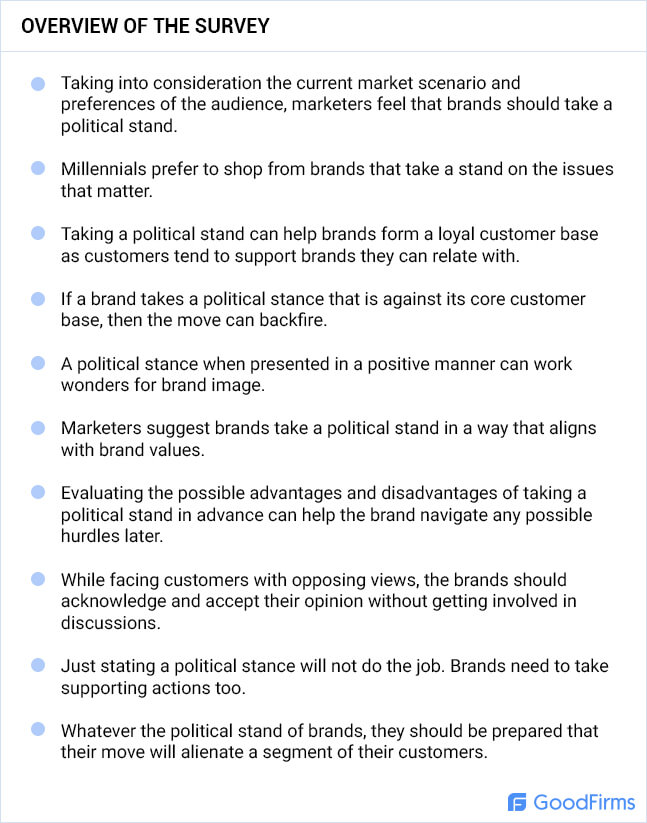
Should Companies Take A Political Stand?
‘To be or not to be’ is a question that every business or individual faces while making a tough decision. This is the dilemma that brands may be facing while taking a political stand. The reason being the customer’s reaction could be either positive or negative. However, 63.2% of marketers say that brands should take a political stand looking at the current market scenario.
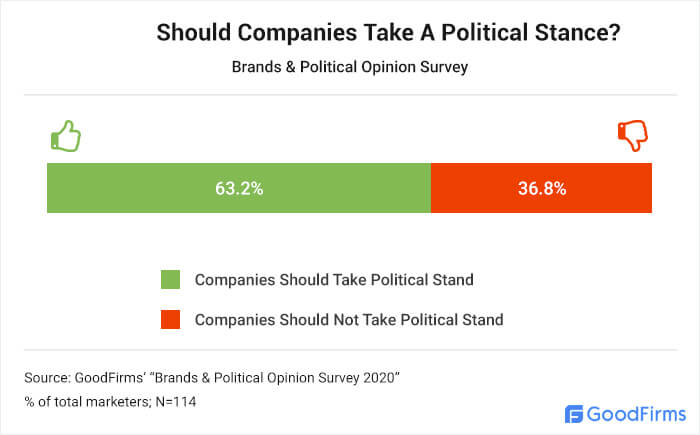
Heinrich Long, the Privacy Expert at Restore Privacy is one of them. In his opinion, today customers would rather spend money on brands that express their social inclining than the ones that don’t. He said, “It will attract people who appreciate the statement and it will make them feel more at ease spending their money with you than with a company who is laying low and burying their head in the sand. In addition to being the right thing, morally, the positive publicity of taking a political stand is unmatched.”
A prime example of a brand taking a political stand and getting a positive response for the same is Airbnb. Sonya Schwartz, the Founder of Her Norm said, “Airbnb - After President Trump signed an order that temporarily banned the entry of refugees to America’s borders, Airbnb made an ad that contradicts the decision. In their ad, they used different nationalities and labeled the ad as “We Accept”. It helped the brand to promote Airbnb’s stand on issues of racism and diversity. This also helped the brand to remove the previous negative impression from the incident of racial discrimination on their platform.”
James Pearson, the CEO of eVenturing is among the 36.8% of marketers who think that companies should not take a political stand. “Taking an extreme political stand of corporate entities can be the cause of their major downfall. With this, it can cause distrust, cynicism, and doubt among its consumers. Eventually, this can lead to consumers having cold-shoulders or ostracizing their loyalty over products or businesses,” said James.
Today’s Generation Prefers Brands that Take a Stance
Millennials prefer brands that make some contribution in making society a better place. According to 39.5% of marketers, today’s generation would rather purchase from a brand that stands up for a social cause rather than the one that doesn’t.
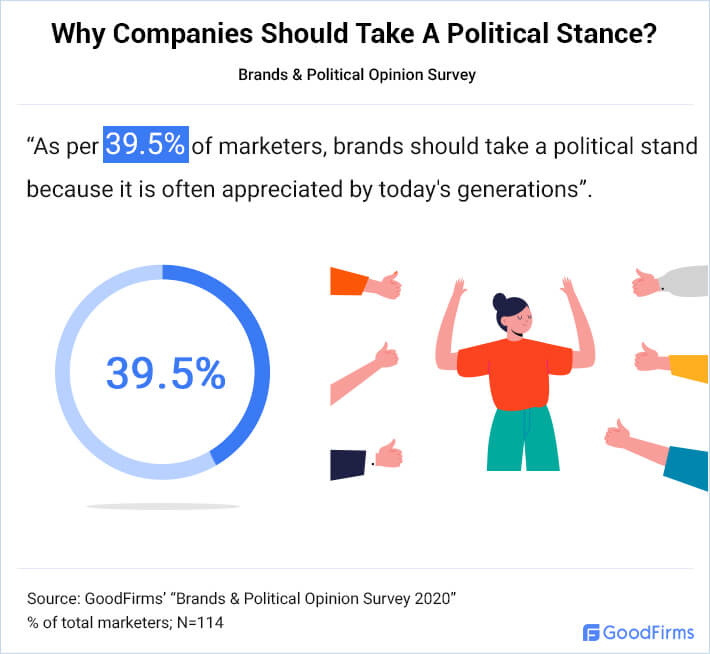
A consumer culture report also shows that 83% of millennials prefer companies that align with their values. Millennials feel that they are doing charity by patronizing such brands.
“In today's climate, it is expected by the next generation of consumers to see their favorite brands speak up and participate. They want to see their values reflected in the brands they support financially,” says Fabian Geyrhalter, the Principal of Finien.
Agreeing with Fabian on the expectations of today’s generation from brands is Laura Conti from Go Kindly. Laura said, “We believe that our customers support us because we do stand for something. The younger generations i.e X gen - want their products and brands to LIVE their values.”
Jesse Silkoff, the Founder of MyRoofingPal also feels that the preferences of people have changed and they have started respecting brands that take a political stand. Jesse says, “I think many people are beginning to respect companies who take a stand and will actually be more likely to work with the ones who do speak out on issues they are passionate about.”
Taking a Political Stance Can Generate Loyalty & Trust
It is a known fact that people remain loyal to brands that they can relate to. It can be either an ad campaign that manages to tug the strings of the target audience’s heart or the brand standing up for a political issue that is close to them. About 31.6% of marketers believe that brands can create a loyal customer base if they take a political stand.
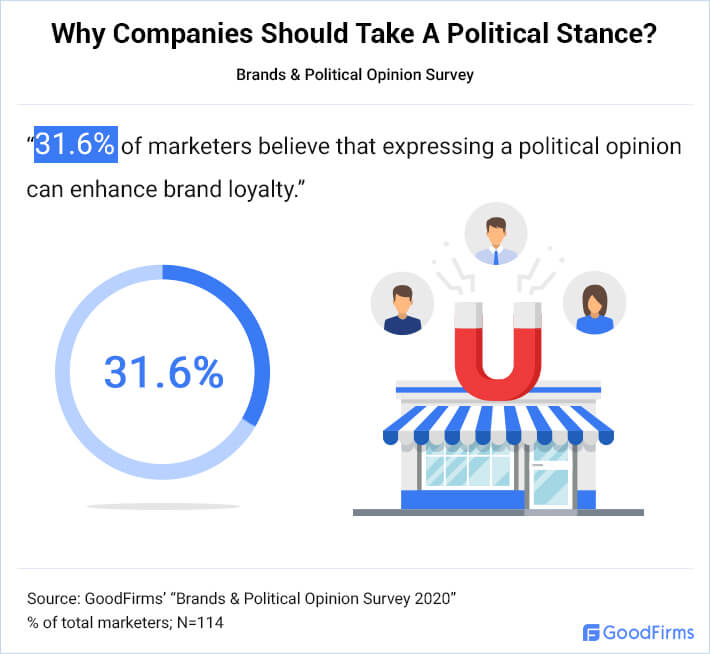
Nowadays, political and social issues have become a common concern, and discussions are a regular affair. So, there are high chances of a brand gaining loyal customers when they contribute to the discussion, according to Channing Muller, Principal of DCM Communications.
“Political and social issues are dominating our lives these days," says Channing, "and by making it clear where your company or brand stands, you could have one of two things (or both!) happen: Secure those who were “casual clients/buyers” into lifelong customers OR Attract those who hadn’t considered you before, or previously chose a competitor, align with your brand because of your stance."
The CEO of Gadget Review, Rex Freiberger, believes that a company taking a political stand may face opposition but it will also get loyal customers. Rex said, “Companies that are outspoken about politics will receive pushback from anyone who disagrees, but they'll also secure the loyalty of those who agree with the company's stance.”
Adam Rizzieri, Chief Marketing Officer at Agency Partner Interactive, firmly believes that brands taking a political stand will be rewarded with customer loyalty and revenue growth. According to Adam, “Generally, taking a strong political position is celebrated by customer loyalty and revenue growth. Taking a political stand, whatever that position may be, can generate loyalty, trust, and maybe even some grace when customer service issues arise.”
If Against the Values of Core Customers, Taking a Political Stance can Kill Your Business
Customers can make or break a business. All the activities of a brand are targeted at retaining existing customers and gaining new customers. So, when a brand takes a political stand that goes against its primary audience, it is bound to backfire.
57.9% of marketers say that a political stand against the core customer base will kill the brand. The opinion prevails irrespective of marketers agreeing to take a political stand or not.
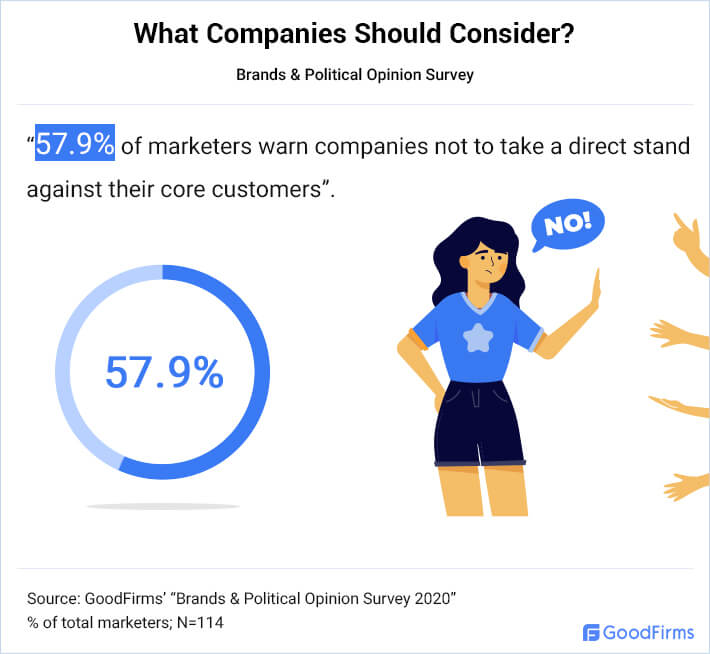
“Businesses need to understand their customer base, specifically the political leanings of their customer base," emphasizes Karen Tibbals - the Founder of Ethical Frames LLC. According to her, brands risk alienating their customers when they make a decision based on their own values. This can backfire on them.
“Taking a political stand can kill a company's brand/business when it's not authentic," says Founder of D Branding, Dino H Carter, "when politics is not part of the brand personality or when it is going exactly against the company's core customer base.” He cites an example of Gillette’s "We Believe: The Best Men Can Be" ad of 2019 that faced major backslash.
The YouTube video’s response was overwhelmingly negative with twice as many dislikes as likes and comments ran negative by a staggering ten to one margin. In the ad’s aftermath, Gillette faced a widespread boycott from its customer base and reported $8 billion losses on its shaving business.
Despite a group of people who appreciated the ad and argued that it simply tried to promote positive behavior, the larger group disliked it. They thought it was insulting to men and heavily stereotyped.
In Any Case, A Segment of Customers Would Always Veer Off
One of the primary impacts of taking a political stand is that brands should be ready to alienate a certain segment of customers.
As seen earlier, customer preferences have changed, and they choose brands that align with their opinions. 42.1% of marketers say that whether a political stand is correct or not, a brand will always lose some customers who have opposing views. So, brands should be ready to face it.
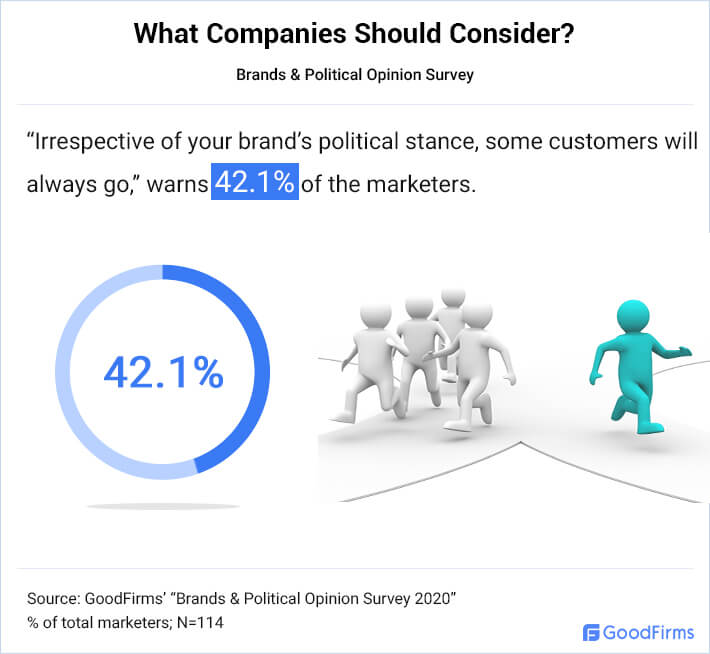
This is because any brand comprises many different individuals related to it. Right from employees to related third parties to the business. Every brand is going to have people related to it with an opposite political opinion. So, when a brand side with a political opinion it automatically upsets the other side. Siddhartha Gupta from Mettl, who also thinks on similar lines said, “Taking a political stand makes you partisan and can subtly lead your prospects and employees to believe that your political stand is what your core beliefs are, even though your mission and vision of the brand can be contrastingly different from that. If you take a political stand, you are alienating a significant chunk of your people and customers.”
Jase Rodley, the Founder/CEO of Dialed Labs, thinks that taking a customer stand can alienate customers as people take politics personally and may get offended. Jase said, “ It can alienate your customers, as they will have a political stance which may differ to yours, people take politics very personally, so offending them can lose your vital business customers.”
Jon Torres, the Founder of JonTorres.com, also feels that companies risk alienating about 50% of their customers when they take a political stand. Jon said, “ When a company decides to take a political stand, they run the risk of alienating 50% of their customer base. There will be an opposing party that will refuse to do business with you based on your vocalization of where you stand.”
Make Your Point in a Positive Manner
A political stand even for the right cause, if presented in a negative manner, can not go down too well with the customers. In contrast, a positive statement from a brand in support of a social or political issue can go a long way in winning the hearts of their audience. According to 52.6% of total marketers, the best way to take a political stand is to present the statement in a positive manner.
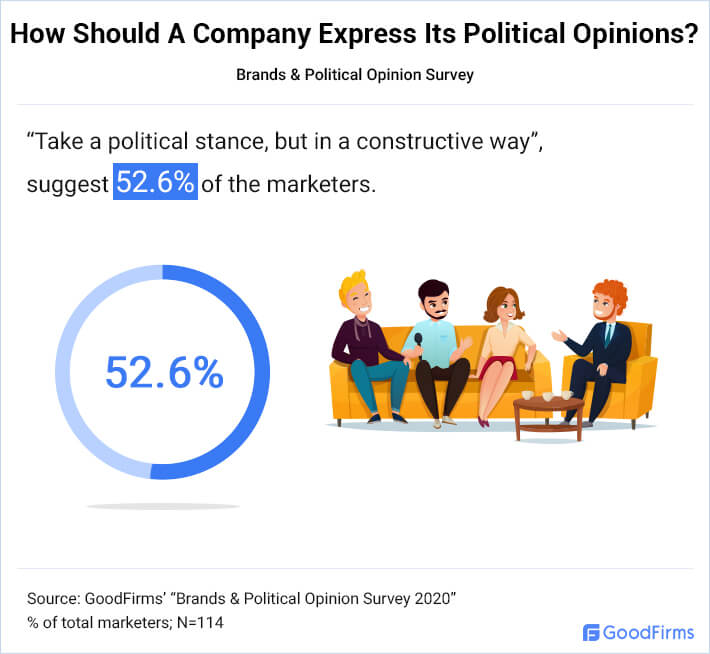
For instance, Budweiser has long been a masculine brand. But it joined hands with the #SeeHer movement. The movement is to increase the positive portrayal of women in advertising. As a result, Budweiser remade three of its ads showing women in a more empowered role.
Teigan Margetts, the Co-Founder of Ethicool Books, explains this with a wonderful example. Teigan states what kind of statements they use to put forward a positive stance. “With everything we do, we try to take a positive stance. For example, instead of saying 'the world is broken and we need to fix it,' we say things like 'we want to create little superheroes.' By focusing on the positive, people associate our brand with something inspiring,” said Teigan.
The about us page of Ethicool books perfectly represents Teigan’s perspective on taking a social stand in a positive manner.

A similar approach has been recommended by Channing Muller from DCM Communications. She explains how to present a positive statement while taking a political stand. “First and foremost, let’s be clear that any stand you take should be a positive one, not a smear campaign for the view you oppose. For example: Instead of “We vehemently oppose racism of any kind.” Say, “We fully support the Black Lives Matter movement,” says Channing.
Not Just Words But Brands Should Take Actions Too
There is no denying the fact that “Actions speak louder than words.” The proverb applies to all walks of life. The proverb is even more relevant when it comes to brands taking a political stand. It is never enough that a brand takes a political stand and doesn’t take relevant actions.
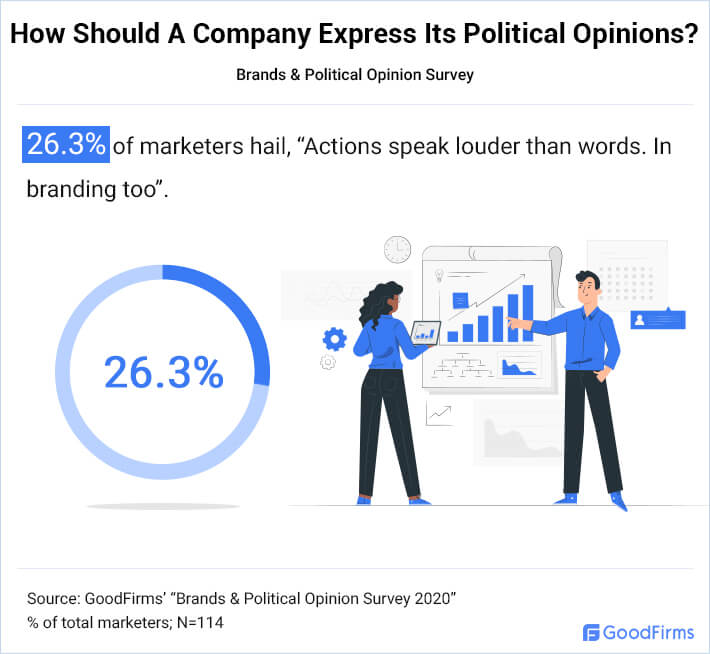
26.3% of marketers suggest that instead of just announcing the stance, brands should include it in their statements, make some changes in their internal processes, and their customer-facing interactions. For instance, partner digital marketing companies of the brand can find creative ways to include the political stand in social media posts. This will earn them the much-needed brownie points from their target audience.
The point of leading with actions and not words is wonderfully explained by Fabian Geyrhalter from Finien. He said, “Remember the term green-washing? That was when brands jumped on the eco-conscious Zeitgeist bandwagon without actually making significant changes in the way they did business. The same is now happening with brands. When brands joined the Black Lives Matter movement by simply posting a black square on #BlackoutTuesday, their comments filled up within seconds by people asking what they were actually doing to support the campaign.”
Lucky Brand Jeans, a denim brand from LA, sets an example among the crowd. They took some actual measures to contribute to the black lives matter movement. The brand closed its websites, offices, and stores on Blackout Tuesday. They gave a paid leave to the employees to peacefully protest, work with the local community or local organizations. The day away from work is to show unity and empathy to the black community.
On Tuesday, June 2nd, Lucky Brand will observe “Black Out Tuesday.” We will be closed for Business. This is not a day off. We have work to do. #BlackOutTuesday #BlackLivesMatter #LuckyTogether pic.twitter.com/CWLCo5SI15
— Lucky Brand (@LuckyBrand) June 2, 2020
As Fabian says, “Partake with your heart and soul. Dedicate dollars and manpower to it. Treat it like a campaign without an end date. Only then will you create change and gain your customer's trust and support in return.”
Respect, Accept, & Acknowledge the Opinion of Customers with Opposite Views
Handling opinionated customers can sometimes prove to be quite tricky, especially when it comes to political opinions. The brand representatives are stuck between standing up for what the brand believes in and peacefully retaining the customer. Hence, a substantial number of marketers i.e 68.4% believe that the best way to deal with opinionated customers is to respect, accept, and acknowledge their opinion without getting involved in a discussion.
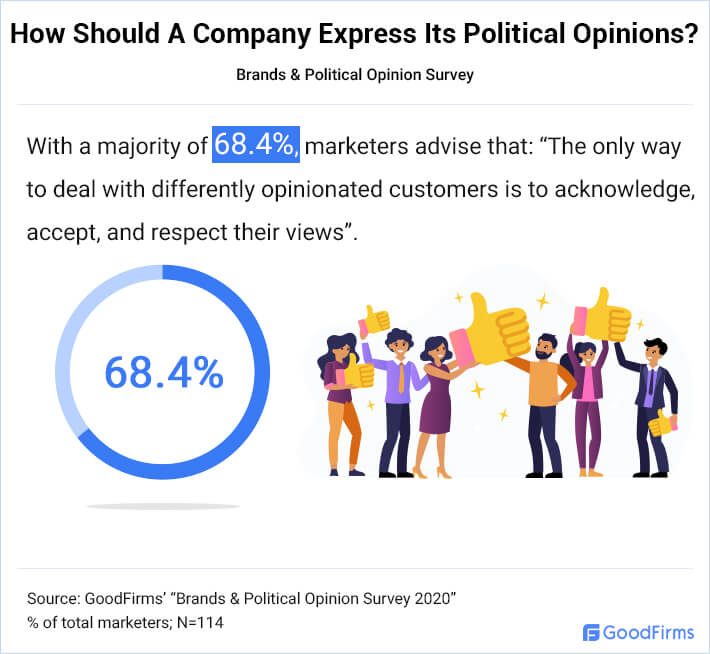
According to Mollie Newton, the best way to deal with opinionated customers is to have a polite conversation without getting into any arguments. She said, “Just accept them and make them feel heard. Respect is the simplest, yet most important thing you can give to opinionated customers. Learn how to listen to them attentively and understand their perspective.” Mollie is the Founder of Pet Me Twice.
The Chief Operating Officer at Hayden Girls, Hosea Chang, said something on similar lines. In his opinion, the quality of customer service should remain the same irrespective of their political/social views. “Customer service has nothing to do with politics, so professionalism is needed at all times. You treat opinionated customers just like any other customer: with politeness, respect, calm, understanding, patience, and professionalism,” said Hosea.
A golden rule that some successful businessmen follow is that they always listen to the customers and don’t argue even if the customer is wrong. So, before taking any action let the customers finish what they have got to say. Ultimately, it’s how the brand responds to the customer that matters and not the facts of the discussion.
Christopher Ulrich, the Founder of Direct Response Group, also believes in this ideology and states that they respectfully acknowledge the viewpoint of opinionated customers. He says, “When we’ve run into clients with strong opinions, we will generally acknowledge their opinion and express the gratitude that we live in such a wonderful country that we can have and openly state opinions about our country.”
Conclusion
Some of the biggest names in the industry have started taking a political stance. Brands stand up for what they believe in to fulfill their responsibility towards society and attract the right kind of audience. Today’s generation is more aware of social issues and the importance of taking a stand. Hence, they would rather be loyal customers of companies making political statements rather than the ones who remain neutral.
However, it is not as easy as it seems. There are also examples of brands taking a political stand and yet face backlash from people. There can be many reasons for the brands getting such a response. While it may seem like irreparable damage to the brand image, public relations firms can work wonders in making things right. Therefore, every brand partners with a PR agency to make sure that every move ends up creating the right impression in the audience’s minds.
Table of contents
- Should Companies Take A Political Stand?
- Today’s Generation Prefers Brands that Take a Stance
- Taking a Political Stance Can Generate Loyalty & Trust
- If Against the Values of Core Customers, Taking a Political Stance can Kill Your Business
- In Any Case, A Segment of Customers Would Always Veer Off
- Make Your Point in a Positive Manner
- Not Just Words But Brands Should Take Actions Too
- Respect, Accept, & Acknowledge the Opinion of Customers with Opposite Views
- Conclusion








